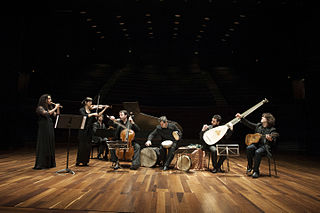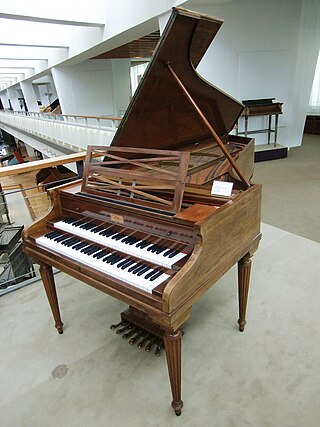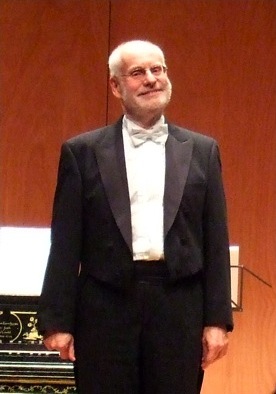
Trevor David Pinnock is a British harpsichordist and conductor.

Historically informed performance is an approach to the performance of classical music which aims to be faithful to the approach, manner and style of the musical era in which a work was originally conceived.

Wanda Aleksandra Landowska was a Polish harpsichordist and pianist whose performances, teaching, writings and especially her many recordings played a large role in reviving the popularity of the harpsichord in the early 20th century. She was the first person to record Johann Sebastian Bach's Goldberg Variations on the harpsichord in 1933. She became a naturalized French citizen in 1938.

Concert champêtre, FP 49, is a harpsichord concerto by Francis Poulenc, which also exists in a version for piano solo with very slight changes in the solo part.
A harpsichord concerto is a piece of music for an orchestra with the harpsichord in a solo role. Sometimes these works are played on the modern piano. For a period in the late 18th century, Joseph Haydn and Thomas Arne wrote concertos that could be played interchangeably on harpsichord, fortepiano, and pipe organ.
Ralph Leonard Kirkpatrick was an American harpsichordist and musicologist, widely known for his chronological catalog of Domenico Scarlatti's keyboard sonatas as well as for his performances and recordings.

Basso continuo parts, almost universal in the Baroque era (1600–1750), provided the harmonic structure of the music by supplying a bassline and a chord progression. The phrase is often shortened to continuo, and the instrumentalists playing the continuo part are called the continuo group.
The English Concert is a baroque orchestra playing on period instruments based in London. Founded in 1972 and directed from the harpsichord by Trevor Pinnock for 30 years, it is now directed by harpsichordist Harry Bicket. Nadja Zwiener has been orchestra leader (concertmaster) since September 2007.

Gustav Maria Leonhardt was a Dutch keyboardist, conductor, musicologist, teacher and editor. He was a leading figure in the historically informed performance movement to perform music on period instruments.

Masaaki Suzuki is a Japanese organist, harpsichordist, conductor, and the founder and music director of the Bach Collegium Japan. With this ensemble he is recording the complete choral works of Johann Sebastian Bach for the Swedish label BIS Records, for which he is also recording Bach's concertos, orchestral suites, and solo works for harpsichord and organ. He is also an artist-in-residence at Yale University and the principal guest conductor of its Schola Cantorum, and has conducted orchestras and choruses around the world.

Antonius Gerhardus Michael Koopman, known professionally as Ton Koopman, is a Dutch conductor, organist, harpsichordist, and musicologist, primarily known for being the founder and director of the Amsterdam Baroque Orchestra & Choir.

George John Malcolm CBE KSG was an English pianist, organist, composer, harpsichordist, and conductor.

Christophe Rousset is a French harpsichordist and conductor, who specializes in the performance of Baroque music on period instruments. He is also a musicologist, particularly of opera and European music of the 17th and 18th centuries and is the founder of the French music ensemble Les Talens Lyriques.
Laurence Alexander Cummings is a British harpsichordist, organist, and conductor. He is currently music director of the Academy of Ancient Music.
Millicent Irene Silver was an English harpsichordist, who began her career as a pianist and violinist.

Martin Pearlman is an American conductor, harpsichordist, composer, and early music specialist. He founded the first permanent Baroque orchestra in North America with Boston Baroque in 1973–74. Many of its original players went on to play in or direct other ensembles in what became a growing field in the American music scene. He later founded the chorus of that ensemble and has been the music director of Boston Baroque from its inception up to the present day.

Anthony Newman is an American classical musician. While mostly known as an organist, Newman is also a harpsichordist, pianist, composer, conductor, writer, and teacher. He is a specialist in music of the Baroque period, particularly the works of Johann Sebastian Bach, and has collaborated with such noted musicians as Kathleen Battle, Julius Baker, Itzhak Perlman, Eugenia Zukerman, Jean-Pierre Rampal, Leonard Bernstein, Michala Petri, and Wynton Marsalis, for whom he arranged and conducted In Gabriel’s Garden, the most popular classical record of 1996.
Alan George Cuckston is an English harpsichordist, pianist, conductor, and lecturer.

Philip Manuel was an American pianist, organist, harpsichordist and music educator. With pianist, organist and harpsichordist Gavin Williamson, he formed a duo in 1922, known as Manuel and Williamson, that helped promote the use of harpsichords as concert instruments. In the spring of 1935, the duo were the first professionals to play Bach's Concerto for Four Harpsichords, BWV 1065, in the United States on this instrument.
Johann Sebastian Bach's music has been performed by musicians of his own time, and in the second half of the eighteenth century by his sons and students, and by the next generations of musicians and composers such as the young Beethoven. Felix Mendelssohn renewed the attention for Bach's music by his performances in the 19th century. In the 20th century Bach's music was performed and recorded by artists specializing in the music of the composer, such as Albert Schweitzer, Helmut Walcha and Karl Richter. With the advent of the historically informed performance practice Bach's music was prominently featured by artists such as Nikolaus Harnoncourt, Gustav Leonhardt and Sigiswald Kuijken.













